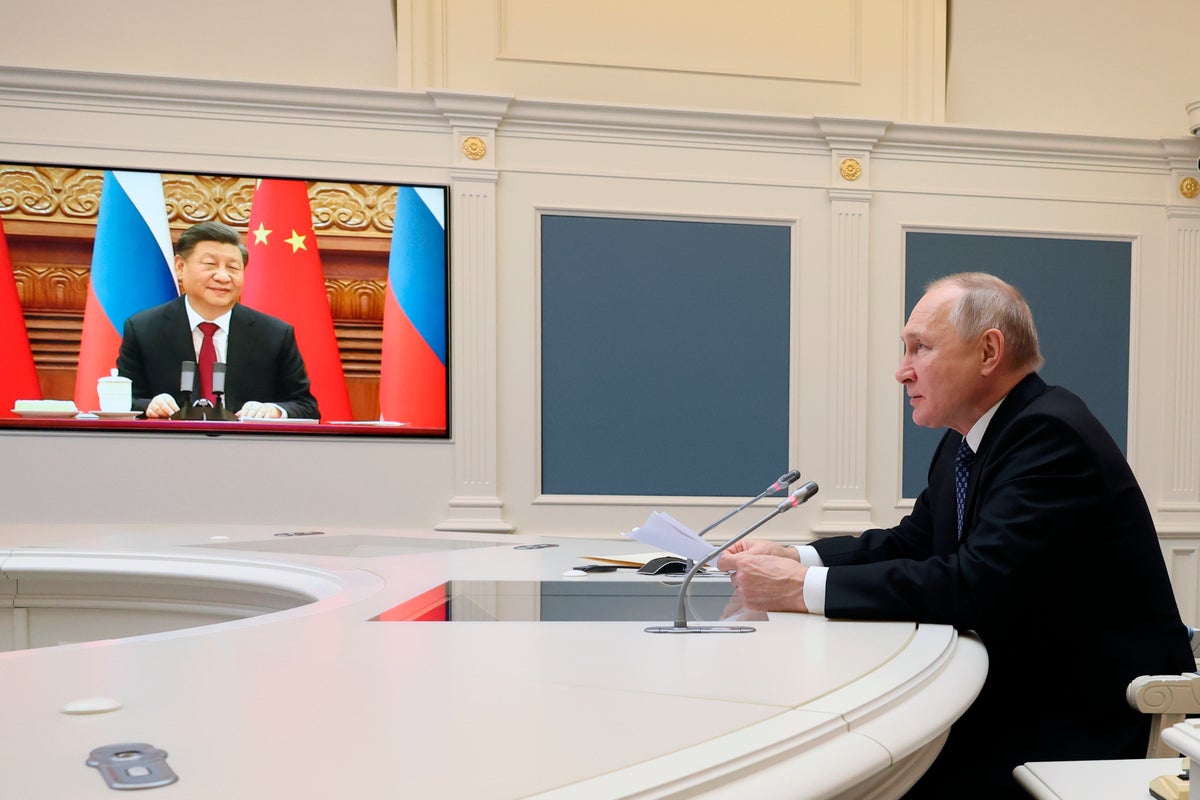
Russian President Vladimir Putin and Chinese leader Xi Jinping vowed Friday to deepen their bilateral cooperation against the backdrop of Moscow’s 10-month war in Ukraine, which weathered another night of drone and rocket attacks following a massive missile bombardment.
Putin and Xi made no direct mention of Ukraine as they held bilateral talks via videoconference. But they hailed strengthening ties between Moscow and Beijing amid what they called “geopolitical tensions” and a “difficult international situation.”
“In the face of increasing geopolitical tensions, the significance of the Russian-Chinese strategic partnership is growing as a stabilizing factor,” Putin said. He invited Xi to visit Moscow in the spring.
In Ukraine, authorities reviewed the toll from a widespread Russian missile attack on power stations and other vital infrastructure Thursday that was the biggest such bombardment in weeks. Four civilians were killed during the barrage, according to Kyrylo Tymoshenko, the deputy head of the Ukrainian president’s office.
The General Staff of the Armed Forces of Ukraine said in its Friday morning update that Russian forces had unleashed a total of 85 missiles and 35 airstrikes on Ukrainian targets in the previous 24 hours. Russia also launched 63 attacks from multiple launch rocket systems, the military report said.
Following the first waves of missiles on Thursday morning, Russian forces attacked Ukraine with Iranian-made Shahed-131/136 drones on Thursday night and early Friday, all of which were shot down, the Ukrainian air force said.
Some were aimed at Kyiv, Mayor Vitali Klitschko said Friday. Of seven kamikaze drones launched against the Ukrainian capital, two were shot down on the approach to the city and five over Kyiv itself, according to Klitschko.
Windows in a residential building and one non-residential building were damaged as a result of falling debris, but no casualties were reported, he said.
Further east, the Ukrainian military reported its forces shot down 10 attack drones in the central-eastern Dnipropetrovsk province and southeastern Zaporizhzhia provinces.
Almost 30 Russian shells were fired at Marhanets in Dnipropetrovsk province on Thursday night, according to regional Gov. Valentyn Reznichenko. Marhanets is located directly across the Dnieper River from the Zaporizhzhia Nuclear Power Plant, Europe’s largest nuclear power station.
The city of Bakhmut in Donetsk province continued to be a key target of Russia’s grinding offensive in the industrial east, Ukrainian Defense Ministry spokesperson Oleksandr Shtupun said.
Other populated places in Donetsk, neighboring Luhansk provice, northern Ukraine's Chernihiv, Sumy and Kharkiv provinces, and Zaporizhzhia and Kherson provinces in the south all came under attack.
Ukrainian President Volodymyr Zelenskyy said in his nightly video address that Russia hasn’t abandoned plans to capture all of Donetsk, aiming to accomplish the goal by New Year's Day. Zelenskyy also warned Ukrainians there could be another widespread air assault.
“There are two days left in this year. Perhaps the enemy will try once again to make us celebrate the New Year in the dark. Perhaps, the occupants are planning to make us suffer with the next strikes on our cities," he said. "But no matter what they plan, we know one thing about ourselves: we will survive. We will. We will drive them out. No doubt about it. And they will be punished for this terrible war.”
Putin, during his call with Xi, noted that military cooperation has a “special place” in the relationship between their countries. He said the Kremlin aimed to "strengthen the cooperation between the armed forces of Russia and China.”
Xi, in turn, said through a translator that “in the face of a difficult and far from straightforward international situation,” Beijing was ready “to increase strategic cooperation with Russia, provide each other with development opportunities, be global partners for the benefit of the peoples of our countries and in the interests of stability around the world.”
Ties between Moscow and Beijing have grown stronger since Putin sent his troops into Ukraine on Feb. 24. Just last week, Moscow and Beijing held joint naval drills in the East China Sea.
China, which has promised a “no limits” friendship with Russia, has pointedly refused to criticize Moscow’s actions in Ukraine, blaming the U.S. and NATO for provoking the Kremlin, and has blasted the punishing sanctions imposed on Russia.
Russia, in turn, has strongly backed China amid the tensions with the U.S. over Taiwan.
Russia and China are both facing domestic difficulties. Putin is trying to maintain domestic support for a war that has lasted longer than anticipated, while a surge in COVID-19 cases has overwhelmed hospitals in China.
__
Follow AP’s coverage of the war in Ukraine: https://apnews.com/hub/russia-ukraine







